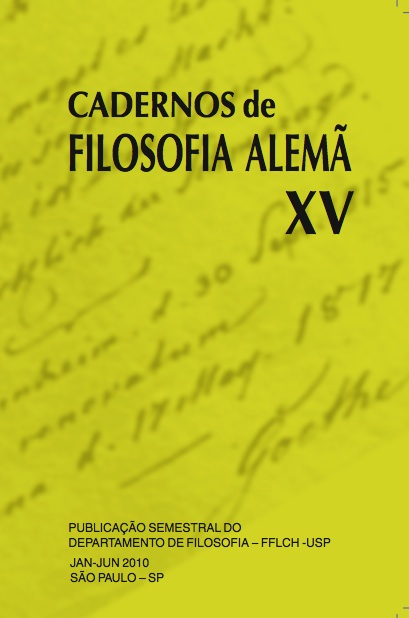Heidegger and the Doctrine of Personality in Kant
DOI:
https://doi.org/10.11606/issn.2318-9800.v0i15p41-58Keywords:
Transcendental personality, Psychological personality, Moral personality, Kant, Heidegger.Abstract
It is about the development of the concept of personality in Kant according to Heidegger and under three determinations: transcendental personality, psychological personality and moral personality. Specifically, the objective is to define the strict and authentic concept of personality – expressed in the moral personality – related to the most general concepts, not only of the transcendental personality but also of the psychological one. In the most general concepts the ontology is not possible. In determining the transcendental personality the subject entity is not manifested. However, what makes the ontology not feasible is the fact that this entity (the soul) is not taken in itself, that is, it is not independent from the body. The most strict and authentic concept in Kant according to Heidegger is what makes possible one ontology once it is the only one to, from the peculiarity of the moral auto-consciousness compared to the empirical auto-consciousness, manifest ontologically and promptly the person in what he is: his dignity.Downloads
Downloads
Published
Issue
Section
License
Information and conceptions on the texts are complete responsibility of the authors.
All the articles submitted before July 5th 2018 and those published after July 2021 are licensed under a CC BY-NC-ND license – except those published between the aforementioned dates, which are under the CC BY-NC-SA license. The permission for the translation of the material published under the license CC BY-NC-ND by third parts can be obtained with the consent of the author.
Open access policies - Diadorim
Rules applied before July 5th 2018:
Presenting a submission to our Editorial Board implies granting priority of publication for “Cadernos de filosofia alemã”, as well as transferring the copyright of texts (once published), which will be reproduced only with the manifest authorization of the editors. Authors keep the right to reuse the texts published in future editions of their work, without paying any fees to "Cadernos”. We will not grant the permission to re-edit or translate the texts for third parts without agreement of the author.


